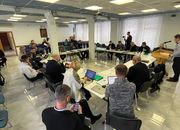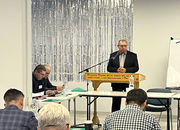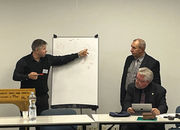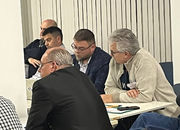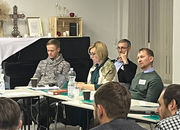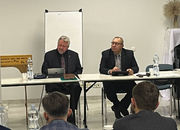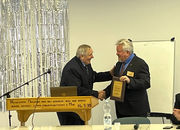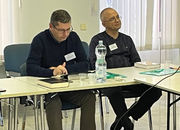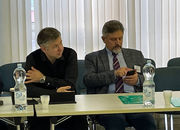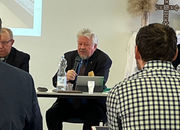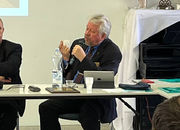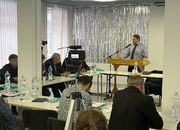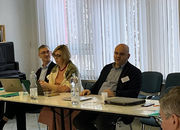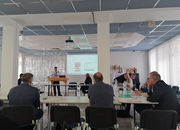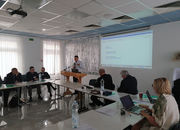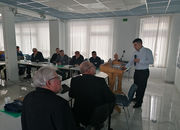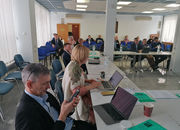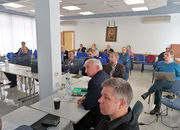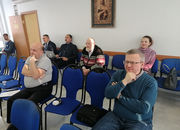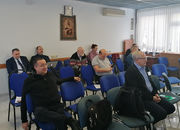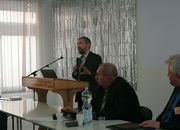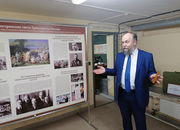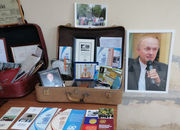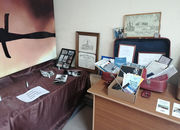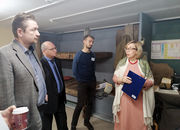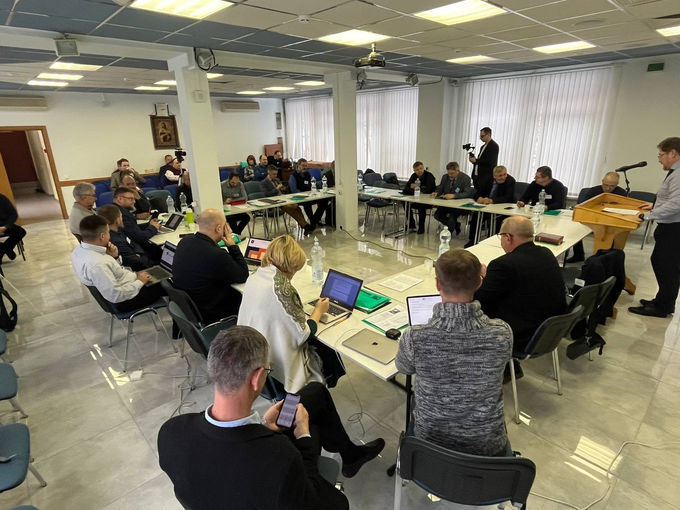
“The Kingdom of God, Church and Society” - Russian UECB Council for Christian Education
“And Jesus came near and said to them,
“All authority in heaven and on earth has been given to Me.”
go and teach all nations"
Matthew 28:18-19
The theme of the conference was “The Kingdom of God, Church, Society,” and attended by representatives of 15 Christian schools, both formal and informal educational programs from Moscow, Noyabrsk, Kursk, Samara, Krasnoyarsk, Rostov-on-Don, Chelyabinsk, Bryansk, Novosibirsk, Balashikha, St. Petersburg, Kemerovo and other Russian cities.
As the gathering began, everyone was greeted by the Russian UECB President, Director of the Moscow Theological Seminary (MTS), and pastor of Calvary church in Moscow, Peter Mitskevich.
Novosibirsk SeminaryVP of Academic Affairs, and pastor of Grace Church in Berdsk, Pavel Togobitsky spoke about the significance of the teaching about the Kingdom of God. In his speech he noted:
“Among Protestants today there are four main approaches to how the presence of the Kingdom of God in the world at the present moment is understood, and how the Kingdom of God and the church relate to each other.
- The first approach is that the main embodiment of the Kingdom of God is considered to be the local church, a community of believers that opposes the world, is in hostile relations with it, and isolates itself from the world. At the same time, the main efforts of the church are aimed at maintaining its own purity and faithfulness, as well as attracting people into the church.
- The second approach is that two kingdoms exist simultaneously - spiritual and worldly. Both are controlled by God. But these kingdoms live according to different laws. Man is a citizen of two kingdoms at the same time. In the spiritual kingdom he acts in accordance with grace and the principles of the coming Kingdom; in the worldly he acts in accordance with God's law, also revealed in general revelation. Depending on the area, different principles and, partly, different morals are used. You need to be a good Christian in the church and a good worker in society.
- The third approach is that everything belongs to God and He reigns over everything in the universe, although the main embodiment of the Kingdom is still the Church. Through her, God makes changes in this world. With this approach, the task of people belonging to the Church is not only to evangelize, but also to act in all spheres of life precisely as Christians - in society, in the family, politics, art, education, etc. – bringing Christian values everywhere.
- The fourth approach is that the Kingdom of God simply is this whole world. God carries out His mission in this world to establish His order. The church must view itself as one of the instruments of God's work, recognizing what He is doing and joining in with the works of God. So here the focus is no longer on intra-church issues and not on a person’s personal salvation, but first of all on the embodiment of God’s justice in the world around us.”
Mikhail Ivanov, pastor of the Dmitrov Church, teacher at MTS, head of the department of theology and catechesis of the UECB, drew attention to several key truths in his speech on the topic “The Kingdom of God in the Church and through the Church.” “When we show love to the world, only then do we show a loving King - Jesus Christ. There is only God-fearing obedience, and sometimes in churches you see “successful Christianity” instead of God-fearing.”
Practical examples of the interpenetration of the Kingdom of God and society were given by Vladislav Vovk, pastor of the Istra Salvation Church. Being a member of the Public Chamber of the city district in the Moscow region, a participant in the Russian public organization “Support of Russia”, various volunteer movements, he recalled that “you cannot be born into the Kingdom of God. “Truly, truly, I say to you, unless someone is born again, he cannot see the kingdom of God” (John 3:3). You can preach the gospel everywhere. A fitness T-shirt with the inscription “The Kingdom of God is taken by force” contributed to the fact that two athletes are already preparing for baptism, and these words were placed in the gym instead of a quote from Schwarzenegger.”
Southern Russian Regional Pastor in Maisky, Kabardino-Balkarian Republic, Viktor Levashov, presented reflections on the topic “Eschatology and the Church.” In them, he noted that understanding this issue will determine how we perceive the material world around us, which God created. Our belief in what will happen to creation shapes our attitude towards it. The speaker also emphasized that theology should be a running dialog. We need to listen to Christians of past eras (diachronic dialogue) and to Christians today, from different cultures and faiths (synchronic dialogue),
Pavel Togobitsky made important conclusions based on the brothers’ presentations on the main theme of the conference: “Today we heard a lot about the fact that initially the first approach was characteristic of Russian Evangelical Christian Baptists. This was largely due to the very difficult living conditions within the Soviet Union. And somewhere this approach reproduces the approach of the Mennonites during the Reformation, who were also in very difficult conditions. But conditions are gradually changing and new opportunities are emerging. At the same time, interest in other approaches is growing. This is, first of all, an approach associated with the transformation of the surrounding world, with the more active involvement of Christians in what is happening around them and in the embodiment of the Christian worldview, not only within the church, but also in various kinds of social activities, etc. Although there are some elements of the second approach. We understand that there is a certain significance and value in some kind of social work in itself and the fourth approach, when we have a more positive outlook in general on the entire world around us and on the actions of God in this world and on the possibility of participation in it. So, I would say, the conversation shows that we have an interest in a broader view of the Kingdom of God and in greater involvement of the Church in activities beyond its own local community.”
The importance of the conference topic for our UECB churches was noted by Viktor Levashov: “Understanding the Kingdom of God influences our practical life. Either we withdraw within ourselves, or we take an active position and influence society with a virtuous life. On the other hand, it is important to understand where the boundaries of this influence are, so as not to leave the preaching of the Gospel of Jesus Christ, for example, in the “eco-gospel” or “social gospel”.
I believe that it is precisely necessary to have a balanced approach to theology and to the analysis of practical life, in order to protect us from extremes. We are talking about a dialogue of different approaches to applying the interpretation of Scripture to practical life. In this way, we enrich each other and help not to go to extremes.”
The executive director of the Theological Evangelical Association of Eurasia, Alexander Spichak, spoke about the inevitability and effectiveness of the interaction between formal and informal Christian education. At the moment, TEAE includes educational institutions in Eurasia, where thousands of students of various Christian denominations from 8 countries of the world study. The tasks for Christian educational centers are set by the local church - this is high-quality training of pastors, teachers of children's and adolescent Sunday schools, ministers for musical worship, and directors of rehabilitation centers. Modern challenges are that we need to train good teachers for schools and take care of the economic survival of schools.
- All the reports provoked a long, thoughtful discussion. It is during such meetings that the methods used in the education of Christian workers are improved. This conference is dedicated not only to theological topics, but to the fact that Jesus Christ is the King of our lives, not only in heaven, but here and now, present in our hearts and minds, encouraging us to act according to His teaching, - said Peter Mickiewicz at the end of the conference.
Alla Stambolidi, Zoya Bardina
Photo: Alla Stambolidi, Denis Gostev


